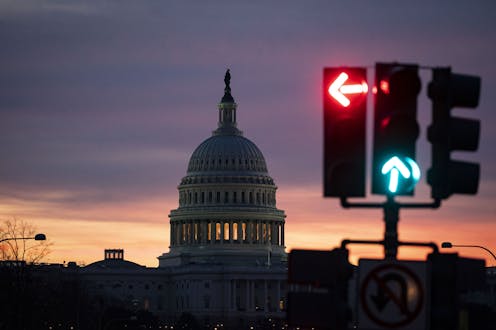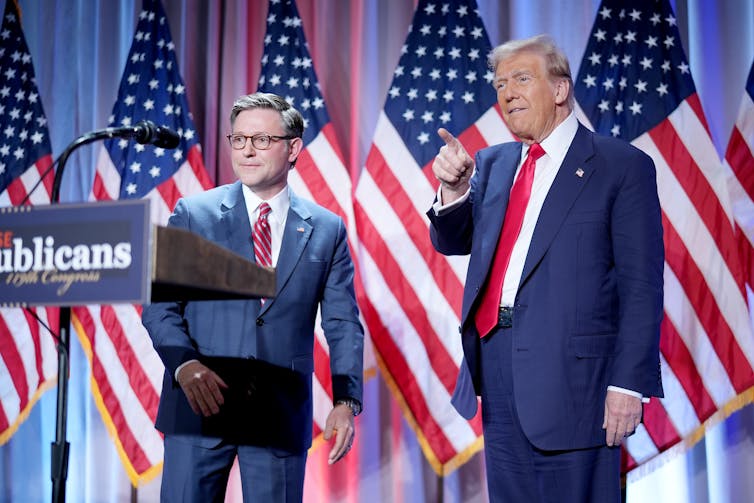Trump’s agenda will face hurdles in Congress, despite the Republican ‘trifecta’ of winning the House
Gridlock can still happen under unified government, and for reasons that are likely to be on full display in the 119th Congress, where the GOP controls both houses under a Republican president.

Beginning in January 2025, Republicans in Washington will achieve what’s commonly known as a governing “trifecta”: control over the executive branch via the president, combined with majorities for their party in both the House and the Senate.
You might think that a trifecta, which is also referred to as “unified government” by political scientists, is a clear recipe for legislative success. In theory, when political parties have unified control over the House, the Senate and the presidency, there should be less conflict between them. Because these politicians are part of the same political party and have the same broad goals, it seems like they should be able to get their agenda approved, and the opposing minority party can do little to stop them.
But not all trifectas are created equal, and not all are dominant.
Research shows that political gridlock can still happen even under a unified government for reasons that are likely to be on full display when Republicans assume leadership of Congress and the presidency.

Majority size matters
A unified government will make President Donald Trump’s ability to enact his agenda much easier than if, for example, Democrats controlled the U.S. House, as they did during the second half of his first term, from 2021-2022. But tight margins in both congressional chambers mean that, even with a trifecta, it won’t be a cakewalk.
Trump will be the sixth consecutive president with a trifecta on Day 1 of his presidency. But history – and simple math – show that presidents with trifectas have an easier time passing partisan legislation with bigger majorities. Bigger majorities mean majority-party defections won’t easily sink controversial or partisan legislation. A bigger majority also means that individual members of Congress from either party have less leverage they can use to water down the president’s policy requests.
Trump also held a trifecta during the beginning of his first term in office; in particular, a big Republican majority in the House, which passed major legislation with relative ease and put pressure on their Senate colleagues to comply. Trump signed a major tax reform package in 2017 that was the signature legislative achievement of his first term.
But Trump will have a much smaller advantage when he takes office for the second time. Every president since Bill Clinton has entered office with a trifecta, but Trump’s seat advantage in the House on Day 1 will be the smallest of all of them after all the votes are counted. Trump’s relatively small advantage in the Senate also may put in jeopardy his already controversial proposed cabinet nominations.
Majority party troubles
In addition to the nearly guaranteed opposition from Democrats in Congress, Trump and other Republican leaders can expect continuing internal divisions within their own party.
In a closely divided House or Senate, there are plenty of tools that Democrats, even as the minority party, can use to stymie Trump’s agenda. This most notably includes the filibuster, which would force Republicans to garner 60 votes for any nonbudgetary legislation Trump might wish to pass. But even dominant legislative trifectas, again like the one former President Barack Obama enjoyed when he took office in 2009, can’t prevent divisions within political parties, as different politicians jockey for control of the party’s agenda.
Despite entering office with a 17-vote advantage in the Senate, Obama’s signature legislative achievement – the Affordable Care Act, also sometimes known as Obamacare – had to be watered down significantly to win a simple majority after backlash from conservative Democrats.
Obama’s trifecta was bigger in size; but in a polarized America, a large majority also means an ideologically diverse one.
If Republican infighting in the most recent Congress repeats itself, Trump is likely to face similar pushback from members of his own party in his second term. For the past two years, the Republican-led House has been repeatedly riven by leadership struggles and an often aimless legislative agenda, thanks to a lack of cooperation from the the party’s far-right flank.
This group of lawmakers will largely remain in the next Congress and will be large enough to stall any party-line vote that Speaker Mike Johnson hopes to pass. The potential for continued chaos – especially with a passable legislative agenda on the line – is monumental. If the past is any indication, even a task as fundamental as passing a budget could be challenging, much less major reform to policy areas such as immigration.
Competing pressures
Despite Congress’ reputation as a polarized partisan body, members of Congress ultimately serve multiple masters. The Republican divisions in the current Congress reflect the competing pressures of national party leaders in Washington and the local politics of each member’s district, which often cut against what party leaders want.
For example, some Republicans represent heavily Republican districts and will be happy to go along with Trump’s agenda, regardless of how extreme it is. Others represent districts won by President Joe Biden in 2020 and might be more inclined to moderate their positions to keep their seats in 2026 and beyond.
Trump has also made life difficult for himself by using Congress, as many incoming administrations do, as a hiring pool for his incoming administration. He’s said he would nominate three Republican House members elected for the next Congress to high-level posts in his administration, knocking Johnson’s seat advantage down to the low single digits.
Charlie Hunt does not work for, consult, own shares in or receive funding from any company or organization that would benefit from this article, and has disclosed no relevant affiliations beyond their academic appointment.
Read These Next
AI’s growing appetite for power is putting Pennsylvania’s aging electricity grid to the test
As AI data centers are added to Pennsylvania’s existing infrastructure, they bring the promise of…
Why US third parties perform best in the Northeast
Many Americans are unhappy with the two major parties but seldom support alternatives. New England is…
Abortion laws show that public policy doesn’t always line up with public opinion
Polls indicate majority support for abortion rights in most states, but laws differ greatly between…






